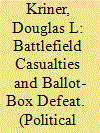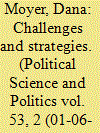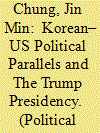| Srl | Item |
| 1 |
ID:
172711


|
|
|
| 2 |
ID:
172728


|
|
|
|
|
| Summary/Abstract |
In the last decade, text-analytic methods have become a fundamental element of a political researcher’s toolkit. Today, text analysis is taught in most major universities; many have entire courses dedicated to the topic. This article offers a systematic review of 45 syllabi of text-analysis courses around the world. From these syllabi, we extracted data that allowed us to rank canonical sources and discuss the variety of software used in teaching. Furthermore, we argue that our empirical method for building a text-analysis syllabus could easily be extended to syllabi for other courses. For instance, scholars can use our technique to introduce their graduate students to the field of systematic reviews while improving the quality of their syllabi.
|
|
|
|
|
|
|
|
|
|
|
|
|
|
|
|
| 3 |
ID:
172688


|
|
|
|
|
| Summary/Abstract |
In the 2016 election, foreign policy may have played a critically important role in swinging an important constituency to Donald Trump: voters in high-casualty communities that had abandoned Republican candidates in the mid-2000s. Trump’s iconoclastic campaign rhetoric promised a foreign policy that would simultaneously be more muscular and restrained. He promised to rebuild and refocus the military while avoiding the “stupid wars” and costly entanglements of his predecessors. At both the state and county levels, we find significant and substantively meaningful relationships between local casualty rates and support for Trump. Trump made significant electoral gains among constituencies that were exhausted and politically alienated by 18 years of fighting. Trump’s foreign policy shows a president beset by competing militaristic and isolationist impulses. Our results suggest that giving into the former may come at a significant electoral cost.
|
|
|
|
|
|
|
|
|
|
|
|
|
|
|
|
| 4 |
ID:
172694


|
|
|
|
|
| Summary/Abstract |
Our research on bias in family formation is rooted in the extant literature of gender and academia but moves beyond discussion of the “leaky-pipeline” metaphor to explore less frequently addressed issues including pregnancy loss, illness, lactation, and challenges faced by academic parents who are the partners of those who have given birth. We explore the lower-order processes that inform the gap in professional achievement between men and women in political science specifically and in academia more broadly. In turn, these lower-order processes manifest as more observable higher-order outcomes such as the disparate rates of tenure and promotion. We conducted a 100-question survey from November 2017 through July 2019 involving more than 300 respondents. Through analysis of open-ended survey responses, we identified a common theme uniting faculty experiences at a range of universities: family formation and parenting can be isolating processes for academics, and there often is a gross lack of both formal and informal support within universities, which creates the potential for setbacks in both personal and professional life. We highlight the challenges confronting academic parents—especially women—and suggest potential avenues to a more inclusive and balanced approach to academia.
|
|
|
|
|
|
|
|
|
|
|
|
|
|
|
|
| 5 |
ID:
172702


|
|
|
| 6 |
ID:
172713


|
|
|
| 7 |
ID:
172706


|
|
|
| 8 |
ID:
172729


|
|
|
|
|
| Summary/Abstract |
What information can I trust? What sources should I include in my paper? Where can I find a quote that fits my argument? Undergraduates ask instructors, classmates, and/or librarians these questions. Meanwhile, instructors bemoan the gap between their expectations for student writing and the finished products. Navigating a large volume of scholarship and critically evaluating potential sources is straightforward for faculty who have long passed key information literacy (IL) thresholds. However, students usually have not reached these thresholds themselves. We offer practical tools—grounded in a new framework for teaching IL—to address these challenges. We demonstrate how instructors can (and should) teach IL skills, with or without direct assistance from librarians. We recommend encouraging students to build context around information sources and slow down as they search. Implementing these tools moves students from passively synthesizing a limited set of (possibly biased) materials to engaging in genuine scholarly inquiry.
|
|
|
|
|
|
|
|
|
|
|
|
|
|
|
|
| 9 |
ID:
172693


|
|
|
|
|
| Summary/Abstract |
Research continues to accumulate showing that in instructor evaluations students are biased against women. This article extends these analyses by examining the dynamics between evaluations and gender and race/ethnicity. In a quasi-experimental design, faculty members teaching identical online courses recorded welcome videos that were presented to students at the course onset, constituting the sole exposure to perceived gender and race/ethnicity. This enables exploration of whether and to what degree the instructors’ characteristics influenced student evaluations, even after holding all other course factors constant. Findings show that instructors who are female and persons of color receive lower scores on ordinal student evaluations than those who are white males. Overall, we add further evidence to a growing literature calling for student evaluations of teaching (SETs) reform and extend it to encompass the effects on racial/ethnic minorities in addition to women.
|
|
|
|
|
|
|
|
|
|
|
|
|
|
|
|
| 10 |
ID:
172727


|
|
|
|
|
| Summary/Abstract |
In 2011, the American Political Science Association stated that integrating issues of diversity, inclusiveness, and equality into political science curriculum and pedagogy was crucial to the success of the discipline in the twenty-first century. Although consensus is forming about the need to teach diversity, the question of how to do this effectively remains open. This article describes an archives-based assignment in an introduction to American government course created by the authors of this article—a professor of political science and the college archivist—that includes greater understanding of diversity and engaged citizenship as learning objectives. For this assignment, students are immersed in archival material about their own college and tasked with analyzing the political actions of previous generations of students as the civil rights and women’s movements emerged, as the student population became more diverse, and as the campus reacted to national and local events relating to racial intolerance and injustice. By examining their college’s political past—both the conflicts that animated the community and the student-led efforts to make the campus more inclusive—current students engage with issues of diversity and political activism in a way that helps them better understand themselves and their role as citizens in a democratic nation.
|
|
|
|
|
|
|
|
|
|
|
|
|
|
|
|
| 11 |
ID:
172689


|
|
|
|
|
| Summary/Abstract |
Political scientists increasingly enlist the work of historians but they often treat this work in a nonchalant or superficial way, which makes their evidentiary record questionable. It follows that we need to check the validity of the interpretation of historians’ work in review processes. This article argues that enlisting historians as reviewers is not the answer. Instead, it proposes four simple criteria that can be used to flag situations in which the use of historians’ work as empirical evidence is unconvincing. The general purpose of the article is to increase awareness about what is at stake when political scientists base empirical analysis on evidence gathered by historians.
|
|
|
|
|
|
|
|
|
|
|
|
|
|
|
|
| 12 |
ID:
172722


|
|
|
| 13 |
ID:
172703


|
|
|
| 14 |
ID:
172690


|
|
|
|
|
| Summary/Abstract |
Most political scientists conduct and publish qualitative research, but what training in qualitative methods do political science doctoral programs offer? Do scholarly views converge on the proper content of such training? Analysis of methods curricula and syllabi from 25 leading US political science doctoral programs reveals a troubling gap: only 60% of top departments offer any dedicated graduate training in qualitative methods. Departments can remedy this disjuncture between scholarship and training by enhancing their basic qualitative methods curricula. Our research shows that scholars agree broadly on the content of such training, effective pedagogical practices, major alternatives for curriculum design, and a menu of focused topics. Graduate programs that aspire to train professionally competent qualitative and multi-method researchers now can orient their reform efforts on shared disciplinary standards for qualitative methods training.
|
|
|
|
|
|
|
|
|
|
|
|
|
|
|
|
| 15 |
ID:
172687


|
|
|
|
|
| Summary/Abstract |
This article explicates the intertwined economic and political goals behind the imposition of countersanctions through an analysis of their premises and outcomes for Russia’s domestic economy. The evidence supports the argument that retaliation was designed to benefit the Russian domestic food industry, reorient trade relations, and bolster domestic public support for this sector while politically penalizing sanctioning countries. An important contribution of this article is to demonstrate how sanctions imposed on nondemocratic target countries, which play an important role in international affairs, is like a tit-for-tat game, which may have additional effects and also unintended political, economic, and social consequences not yet observed.
|
|
|
|
|
|
|
|
|
|
|
|
|
|
|
|
| 16 |
ID:
172707


|
|
|
| 17 |
ID:
172720


|
|
|
| 18 |
ID:
172708


|
|
|
| 19 |
ID:
172731


|
|
|
| 20 |
ID:
172734


|
|
|